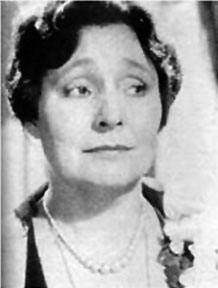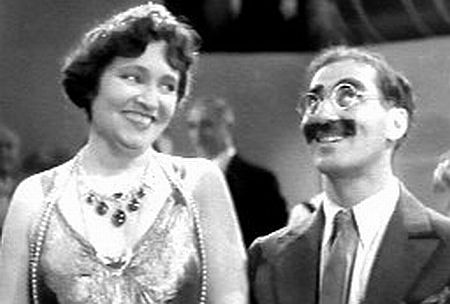
When thinking about actors for this blog, the first ones who often pop into my head tend to be men. Why - because I'm a chauvinist? Well, that's possible. But it's also because the films of the 1930s and 40s were written, directed, and produced by men who liked to include a lovely starlet or two, but weren't as like to give other women in supporting roles a chance to shine. Supporting actresses were often cast simply as mother figures (like the great Beulah Bondi) or vamps like Gloria Grahame. In general, female atmosphere players weren't allowed the latitude (or written as well) as their male counterparts.
But thankfully there are always exceptions to this rule, as grand dame Margaret Dumont proved. The classic example of a typecast character actor, Dumont would forever be known as the haughty matron who is the butt of jokes in Marx Brothers movies, a role she would play both onscreen and off for interviewers. Yet there's more than meets the eye to Dumont, who consciously once referred to herself as the best straight lady in Hollywood. Indeed she was.
Dumont was born Daisy Baker in 1889 and raised mainly by her godfather Joel Chandler Harris, who wrote the popular Uncle Remus stories. She was already part of the literary and theatrical scene by birth and chose to study acting, dance and opera. Later rechristened "Daisy Dumont," she made her debut on stage while still a teenager. It's important to note that while in later years she would cultivate the image of a sophisticate who found the material of the Marx Brothers beneath her, Dumont herself specialized in light comedy and operetta early in he career. The oft-quoted joke, that she didn't understand the Marx Brothers jokes, is almost undoubtedly false, or else a myth that Dumont and publicists perpetuated.
Early in the 1900s, Dumont met John Moller Jr, an heir to a sugar fortune and one of New York City's most prominent bachelors. They married and she retired, seemingly for good, to be a society lady. Yet when Moller died unexpectedly a few years later, Dumont sought solace in her return to the stage, working almost exclusively on Broadway. It wasn't until she was paired with the Marx Brothers in their theatrical revue, "The Cocoanuts," that her career took off. Here she is in the film version:
As a well-regarded actress in her late 30s, Dumont was able to combine her stage experience, comedic timing, and background as a wealthy widow to create the definitive portrait of the lonely dowager. This might sound like a diss, but it's actually high praise. Comedic tropes like this were (and still are) beloved in American comedy and Dumont's regal bearing, distinct elocution, and surprising sweetness made her a perfect foil to the anarchy of the Marx Brothers. And don't forget that the Marx Brothers were not always considered low comedy either; "The Cocoanuts" was written by George S. Kaufman for the stage.

Once the Marx Brothers took the show to Hollywood to be filmed, the rest is history. Dumont was cast in most of their major vehicles, almost always playing the same role, as a rich widow romanced by Groucho Marx. Their sometimes combative onscreen presence masked a genuine affection between the two; Dumont called him "Julie" after his birthname of Julius, and Groucho himself referred to her as the "Fifth Marx Brother." Here's Dumont and Groucho in a classic moment from "Animal Crackers":
Although she didn't need the money, Dumont enjoyed the work and was quickly in demand by other studios to play variations on the same role, which she did with the precision of a champion. In addition to the Marx Brothers, she would also act with W.C. Fields, Roy Rogers, and Jack Benny. It was during the 1930s that stories about her began to circulate, that she was the same haughty society matron both onscreen and off. I can't speak to her haughtiness, but I can say that the idea that she wouldn't know she was acting in a comedy is laughable. Dumont herself knew she was playing the straight man and was proud of her talents, as she said in this candid interview in 1937: "There is an art to playing the straight role. You must build up your man but never top him, never steal the laughs." Just watch her in this clip from "Duck Soup" -- Groucho gets the laughs but only with her careful buildup and priceless reactions:
And build them up she did. Dumont continued to work during the 1940s but slowly retreated from acting in the coming years. Touchingly, her last appearance was on "The Hollywood Parade" in 1965, reunited with Groucho to perform a few bits from "Animal Crackers." She died a few days later, a grand old dame to the end."
Let's leave it with these words from Groucho Marx on th Dick Cavett show, talking about Dumont four years after her death (it starts at 7min in):
Suggested Viewing:
-The Coaconuts
-Animal Crackers
-Duck Soup
-A Night at the Opera
-Never Give a Sucker an Even Break
No comments:
Post a Comment